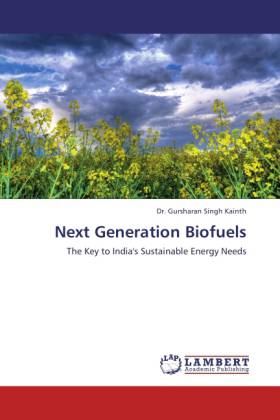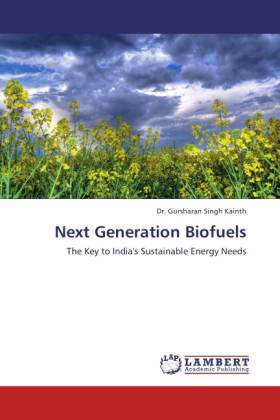
Je cadeautjes zeker op tijd in huis hebben voor de feestdagen? Kom langs in onze winkels en vind het perfecte geschenk!
- Afhalen na 1 uur in een winkel met voorraad
- Gratis thuislevering in België vanaf € 30
- Ruim aanbod met 7 miljoen producten
Je cadeautjes zeker op tijd in huis hebben voor de feestdagen? Kom langs in onze winkels en vind het perfecte geschenk!
- Afhalen na 1 uur in een winkel met voorraad
- Gratis thuislevering in België vanaf € 30
- Ruim aanbod met 7 miljoen producten
Zoeken
Next Generation Biofuels
The Key to India's Sustainable Energy Needs
Gursharan Singh Kainth
Paperback | Engels
€ 82,45
+ 164 punten
Omschrijving
Biofuels hold out the promise of a win-win-win solution. The race is on for a new form of fuel. With gasoline skyrocketing, dependence on imported oil and depleting resources worldwide, finding alternatives to petroleum-based fuel and fuel-related products is urgent. 1G biofuels increase greenhouse gas emissions because of land use change, drives soil erosion and the eutrophication of aquatic ecosystems putting pressure on food availability. Fortunately, scientists have been studying the production of alternative products to make a cleaner, greener fuel for years. As the global fuel mix diversifies, biofuels will be a major source of supply growth. For biofuels to be truly sustainable they need to be made more efficiently without using so many staple foods. And so scientists are developing new biofuels out of anything and everything, from plant waste to pond scum, from rotting garbage to whisky. By mid-century biofuels could be providing over one quarter of all transport fuel, including jet fuel. You may be wondering exactly how this slimy green stuff can be turned into a fuel for cars and airplanes, and even for the heaters that warm our homes and schools.
Specificaties
Betrokkenen
- Auteur(s):
- Uitgeverij:
Inhoud
- Aantal bladzijden:
- 144
- Taal:
- Engels
Eigenschappen
- Productcode (EAN):
- 9783845470061
- Verschijningsdatum:
- 7/09/2011
- Uitvoering:
- Paperback
- Afmetingen:
- 152 mm x 229 mm
- Gewicht:
- 222 g

Alleen bij Standaard Boekhandel
+ 164 punten op je klantenkaart van Standaard Boekhandel
Beoordelingen
We publiceren alleen reviews die voldoen aan de voorwaarden voor reviews. Bekijk onze voorwaarden voor reviews.









